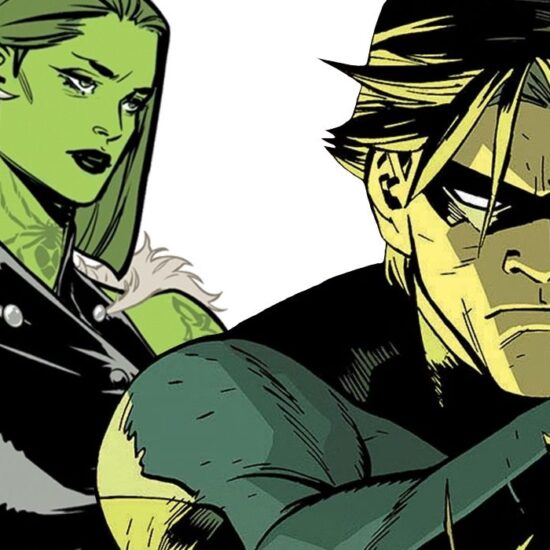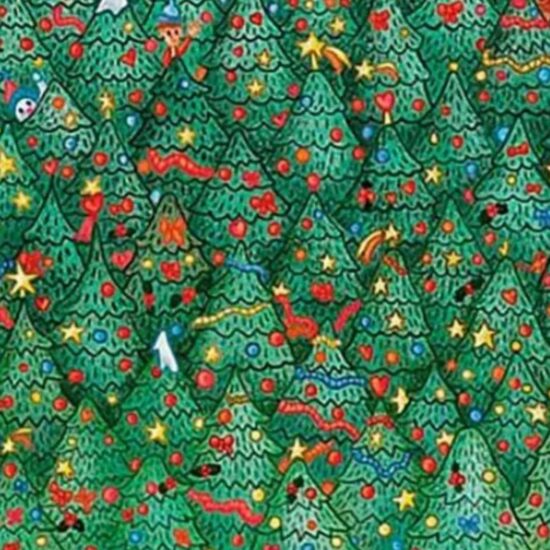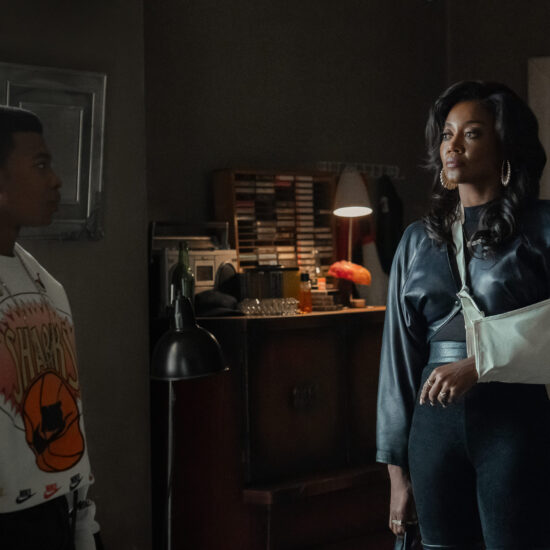
SPOILER ALERT: This story includes plot points in Episode 4 of “The Lord of the Rings: The Rings of Power,” currently streaming on Amazon Prime Video, as well as one major story development written by author J.R.R. Tolkien in the appendices of “The Lord of the Rings.”
Like so many of her castmates of “The Lord of the Rings: The Rings of Power,” Cynthia Addai-Robinson didn’t know exactly who she was playing until she arrived in New Zealand to shoot the Amazon Prime Video series. Unlike several of her castmates, however, Addai-Robinson was not an obsessive fan of the expansive world of Middle-earth created by author J.R.R. Tolkien. But once she was cast as Míriel, the Queen Regent of the resplendently prosperous island nation of Númenor, the veteran actor (“Power,” “Shooter,” “Arrow,” “Spartacus”) dove in head first into the rich history of Númenor and Middle-earth.
“It’s interesting to be an adult, and now have a chance to be immersed in this material,” Addai-Robinson tells Variety. “There are so many people, amongst both my castmates and also just in my personal life — my husband, friends — who talk about how this is material that they were introduced to when they were younger, and the meaning it carried for them at that stage of their life.”
Addai-Robinson discussed what about Tolkien’s world she was most drawn to, how she thought about the upsetting vision Míriel has at the start of Episode 4, and how she prepared for Númenor’s foray into battle in the second half of the first season.
How did you first experience Tolkien’s Middle-earth?
My introduction would have been the Peter Jackson films. I can’t even remember the first time I ever would have heard of “The Hobbit,” or just the books in general. There’s that sort of knowledge that they exist. But no one necessarily encouraged me to visit that literature. Maybe there wasn’t something there that necessarily felt like it was for me.
So how did you approach Tolkien’s work for the show?
When I first started, I wanted to have a sense of just the man himself, what inspired him to create, you know, this entire landscape of characters and languages and worlds. So I read the Humphrey Carpenter biography. I was just curious about any insight into where his head was at, some of his life experiences that would have informed how he created these characters and storylines. But I definitely am someone who is newer to this world. It’s actually been really rewarding, because it’s just sparked and reawakened something in me, I think. Sometimes, as an adult, you’re not necessarily encouraged to have that sense of imagination or play. There’s kind of a cynicism that can set in. Just to have the excuse to immerse yourself in something very fantastical — it feels almost childlike, in a lot of ways.
When you saw the Peter Jackson movies, was there a character who really jumped out to you as a favorite?
The Frodo journey is what felt like my point of access. There’s obviously something very relatable about seeing the little guy triumph and overcome all of these obstacles, and do so in a way that really hammers home the point about fellowship and that you’re not doing it alone. With the series, we’re in the Second Age, and so we are telling the story of the events prior to what most people are familiar with the films. But this theme of fellowship is the one that I personally latch on to the most — for the purposes of our storytelling, but also for this particular group of people who are responsible for creating this adaptation. You know, it’s highly unusual, especially when you’re working in something that for all intents and purposes is television. But this series kind of transcends that idea, right? It’s definitely a series. But to me, it feels like something quite different. When I call it a TV series, it doesn’t sound right.
How do you mean?
To work this intensely on a series with a group of people — the length of time, the heightened storytelling, the heightened set of circumstances — it’s brought us very close, and I think it very much informs what you’re seeing on the screen. That comes through just when I watch it, remembering the experiences I had and actually making it. But it’s conveniently coming through these characters as well. There’s definitely a lot of overlap. I know this is a roundabout way of answering your question. But yeah, the fellowship aspect to me — both for the storytelling, but also for the reality of our situation, this cast and all of the creatives involved in the crew — that is what I kind of think that people are responding to. That’s my hope, anyway.
So how would you describe Míriel to your friends?
I describe her as a queen, a leader, who very much cares about the implications of any decision that she makes on behalf of her people. There is that awareness that any choice that is made, obviously, it would be larger than just affecting her, or even the people who are currently there. It could have far reaching implications for society at large into the future. It is that standard, “heavy is the head that weighs the crown” — there’s that sense of responsibility, a genuine desire to do what is, quote unquote, right, without necessarily knowing what that means.
When I talked with Morfydd Clark a few weeks ago, she said that it wasn’t until she arrived in New Zealand that she learned she was playing Galadriel. So when did you realize you were playing the Queen Regent of Númenor?
It was a similar situation. I was cast during lockdown. I had done a tape [audition] for this role, which at the time did not have the name. It was just a sort of codename. I couldn’t necessarily piece it together with what I knew. I did that in January of 2020. And then the pandemic happened. So I had set the whole thing aside in my mind. When it finally came around, it was end of summer. Once I knew I was cast, I had a chemistry read with Trystan Gravelle, who plays Pharazôn, but neither one of us knew who we were playing. I was told he was my cousin, and we had a couple of scenes that gave a little hints of information, but not much. I eventually left for New Zealand at the end of the year. And when I was in my two-week quarantine to be able to enter the country, that’s when I found out that I would be playing this role.
Did you do a lot of furious googling to find out more about her and what her backstory is?
Oh, definitely. Obviously, you have the literature itself, but what I do find really great is when you do go online to look things up. There are these wikis and people who are quite scholarly in terms of how they lay out the information. They make videos. They condense it down to sort of a quick take. Having said that, for as much as I knew, I didn’t necessarily know what J.D. [Payne] and Patrick [McKay], our showrunners, were going to do with this arc. I didn’t know if they were going to fill in things that I wouldn’t necessarily be able to find in any of the writings. I didn’t know what the endpoint would be. So I was excited at the prospect of having the broad strokes, but knowing that there were going to be some creative choices. I was definitely mindful of wanting to maintain a sense of integrity for this character. The more time I’ve had playing her, the stronger I feel about that sense of protection. This person is important to me, so I want to always feel like the approach is one that is really thought through.
I’m continually impressed by my castmates. We’ve just been on this very extensive press tour, where we’ve all had to articulate things about our character and our worlds. And the thing I appreciate the most about everyone involved in this production is the level of thoughtfulness, not just in terms of the more academic side, but just that desire to really respect and stay true to Tolkien’s intention around these characters.

Courtesy of Amazon Studios
In Episode 4, we see Míriel’s vivid and harrowing vision of what fans of Tolkien and Middle-earth know is coming: the fall of Númenor. Have you seen the finished sequence yet?
I have not. I mean, I know, ultimately, what it should be and what it will be. And in my mind’s eye, you know, I have an image of it. I think they maybe showed me some previz when we filmed those moments. But I am excited to see it.
So what did you think when you saw that Míriel had that vision, knowing that it foreshadows something that will likely be happening much later in the series?
What I think is interesting is, when Galadriel arrives in Númenor, that is the start of the vision, and there is just that question of, is the vision an inevitability, or is there something to be done to change what has been seen? Obviously, the sort of omens and foreboding signs are not necessarily putting her mind at ease.
The episode ends with Míriel committing Númenor’s army to defending the Southlands, and we’ve seen in photographs Amazon’s released that Míriel eventually ends up on horseback — presumably as part of that effort. How did you prepare for what seems like is coming, Númenor riding into battle?
Well, I did have horse riding lessons. Very gentle ones. Thankfully, we have an incredible team that were responsible for all of the horses. Amazingly, almost 10 years ago, I worked on a series, “Spartacus,” that also filmed in New Zealand, and it was the same horse team. My first horse riding lesson: I knew the guy who runs that company. Some of the same horses, believe it or not. And, yeah, I’m definitely somebody who is — I’ll call myself a city slicker. It’s not second nature for me to be on a horse. But it is that wonderful thing, when you’re an actor, and you’re being taught a skill — and you’re not necessarily, you know, wholly comfortable in that skill — the focus that it takes when they call action to really have that confidence and make it look like it’s the most natural thing in the world. I definitely thrive on that, because anybody that would see me in my lessons would probably question if I was ultimately going to be able to maintain that that sense of regality while on horseback.
Did you just prepare for horse riding?
We had a lot of time to prep in these roles. All of that prep really shows. It was a nice way to maintain a through-line when you weren’t filming, to have that sense of your character just in your body. There were the horse riding lessons, the dialect lessons. We had trainers just to be physically fit. We had Pilates, we had stunt training. So we’re doing all of these various things individually, but also in in groups. It’s almost in some ways like a team building. We’re like this little troupe. It’s not just about how you move in the world, it’s how you move in relation to everyone else around you. Without giving anything away, I’m excited because I actually haven’t seen any sort of battle things. Can they say that? I’m looking forward to seeing how it’s all come together.
It seems safe to say that on a “Lord of the Rings” show, there’s going to be some battle sequences.
It’s not that much of a spoiler, but I’ve learned the art of, you know, diplomatically speaking around things.
This interview has been edited and condensed.














